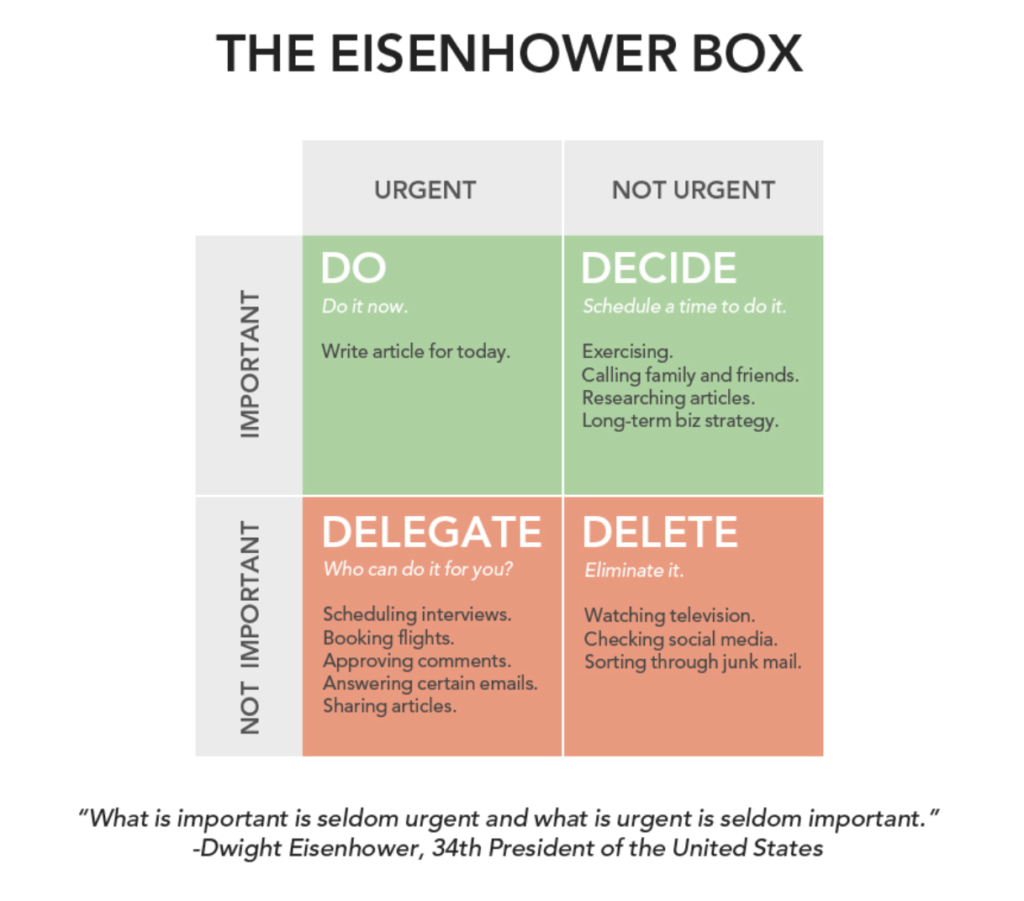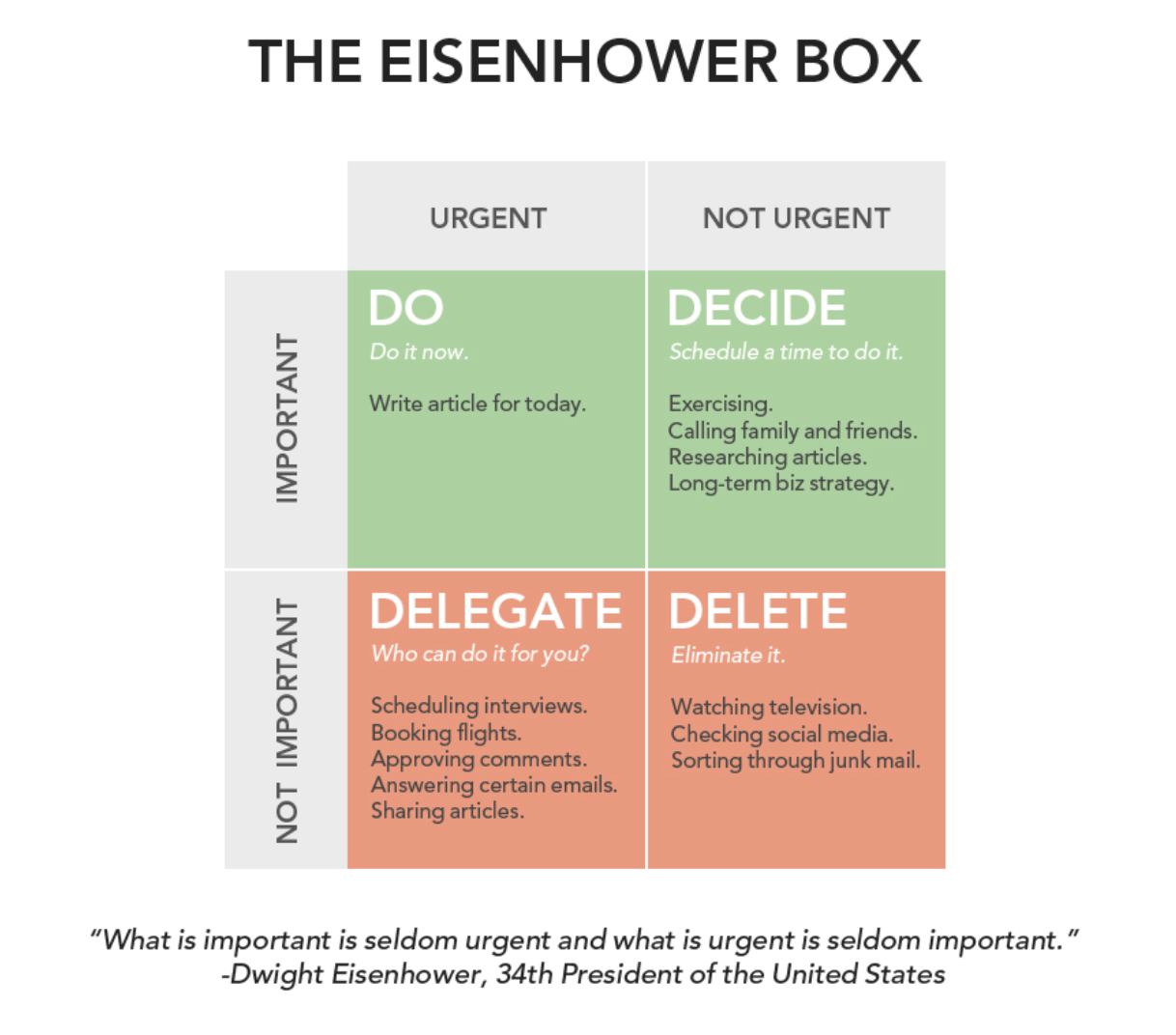Productivity – How to choose what to do

Time is the only non-renewable resource we have. We can earn more money, buy more stuff; but we can never get more time. It’s finite. We make conscious and unconscious choices about how we use it countless times every day. This blog post focuses on a proven technique to prioritise tasks, use your time well and avoid feeling overwhelmed by a never-ending to-do list.
An effective and proven way to identify what you should be working on with your limited time is the Eisenhower Matrix. This simple technique can take the most overwhelming to-do list and highlight which tasks really help you achieve your most important goals.
As the name suggests, U.S. President Eisenhower, a highly productive individual, organised his time using these principles. He categorised tasks as either urgent or important.
- Important tasks are those that help us make progress towards achieving our big goals, both personal and professional.
- Urgent tasks demand your immediate attention. They are often associated with someone else’s needs and goals. Urgent tasks often capture our time and attention because the consequences are immediate.

According to Eisenhower, the tasks you should focus on in priority order are:
- Important / urgent.
- Important / NOT urgent
- Urgent / unimportant
- Unimportant/not urgent.
Important / urgent
There are two types of important and urgent activities:
- Unforeseeable activities requiring immediate attention.
- Things you have put off until a deadline, which have become urgent. (I see you procrastinators, and I feel your self-induced pain.)
It is easy to prioritise these tasks because the need is obvious and the consequences are immediate.
Important / NOT urgent
These are the activities that make your work/life genuinely better and help you achieve your personal and professional goals. There are two types of important/not urgent tasks:
- Tasks that will become urgent if you put them off for long enough.
- Tasks that will never be urgent, BUT would make your life better if you completed them.
Making time for activities in this box is where the magic happens. Identifying the tasks which will become urgent and addressing these early can help you to reduce stress in your life.
Prioritising the tasks that will NEVER be urgent is the hardest type of activity to find time for. However, the reward for your efforts here is huge. These are the activities which generate the greatest mid to long-term gains – and often lead to the greatest levels of satisfaction – when you achieve them.
A good trick is to give the same level of commitment to an important/not urgent task you would give to important/urgent tasks. Respond to interruptions in the same way for both. For example, if you are with a client and someone interrupts you, you would have no trouble saying “I can’t talk now. I can get back to you in 1 hour.” If you are creating a timesaving tool at your desk, respond in the same way. This way, you are still making yourself available to others should they need your unique skill set. If someone really needs you, they will wait, but it also encourages them to attempt to solve the problem themselves. In business, this strategy is known as “yes to the person, no to the task.” For more on this, check out – https://www.mamamia.com.au/how-to-say-no-to-your-boss/ – and before you judge the Mamamia source, let me mention that the author has a PhD in organisational psychology.
Urgent / unimportant
These are the tasks that stop you from achieving your own goals. With a little careful thought, they can often be delegated or deferred. A good thing to do when faced with an activity that demands your urgent and immediate attention is to ask yourself a few questions:
- Is this genuinely urgent? Can this task be put off until later? You might be surprised to discover many things that seem REALLY urgent are actually not when you stop to think about them.
- Does this require my specific and unique skill set, or can it be delegated to someone else?
Other people are the most common source of these tasks.
Unimportant / not urgent
These activities are distractions. Avoid them if possible. Sometimes other people want you to do them. Work out a way to politely say no. To work out if an activity is not urgent and not important, ask yourself, “If I don’t do this activity at all what would happen?” If the answer is “absolutely nothing,” stop giving this activity your valuable time. These items are often not on your to-do list at all, they are the little nothings you allow to creep into your day and steal your time. Recognising them and making conscious decisions about whether to engage in these activities is a great way to find time for the activities and tasks that usually make you say, “oh if only I had more time…” while staring into the middle distance.
Thinking of these activities as rewards for completing important and non-urgent tasks can be effective. When you flip these activities into a reward category, you can often truly enjoy them instead of feeling guilty for engaging in them when you should have been doing something else.
Now there’s no excuse you can’t get through your to-do list!
If you want some more tips on how to stay productive and in the flow, check out our blog about different productivity techniques that keep procrastination at bay.
 Rehab Connection
Rehab Connection 